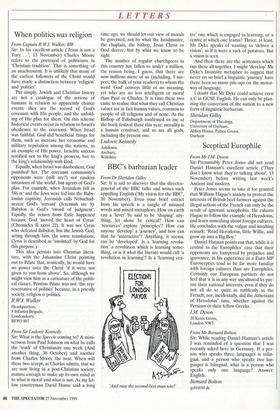When politics was religion
From Captain ft W.J. Walker, BW Sir: In his excellent article ('Jesus is not a Tory... ', 13 November) Charles Moore refers to the portrayal of politicians in 'Christian tradition'. This is something of an anachronism. It is unlikely that many of the earliest followers of the Christ would have made a distinction between 'religion' and 'politics'.
Put simply, Jewish and Christian history are not a catalogue of the actions of humans in relation to apparently chance events: they are the record of God's covenant with His people, and the unfold- ing of His plan for them. On this scheme historical events occur in relation to Israel's obedience to the covenant. When Israel was faithful, God did beneficial things for them, such as increase her economic and military reputation among the nations, as an example of His power. Israelite success testified not to the king's prowess, but to the king's relationship with God.
Equally, when Israel was disobedient, God punished her. The covenant community's opponents were (still are?) not random intrusions of 'the world', but agents of God's plan. For example, when Jerusalem fell in 586 Bc and the Jews were led into the Baby- lonian captivity, Jeremiah calls Nebuchad- nezzar God's 'servant' (Jeremiah roi 9). Babylon is God's 'sword of judgment'. Equally, the return from Exile happened because God 'moved the heart of Cyrus' (Chronicles II 7COCVl 22). It was not Cyrus who defeated Babylon, but the Jewish God, acting through him. (In some translations, Cyrus is described as 'anointed' by God for this purpose.) This idea persists into Christian litera- ture, with the Johannine Christ pointing out to Pilate that, ironically, he would have no power over the Christ 'if it were not given to you from above'. So, although we might view him as a caricature of the politi- cal classes, Pontius Pilate was not 'the rep- resentative of politics' because, in a priestly society, religion is politics.
R.W.J. Walker
Headquarters, 8 Infantry Brigade, Londonderry, BFPO 807


























































































 Previous page
Previous page